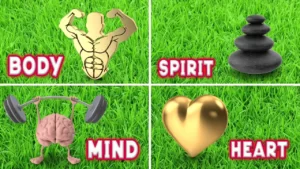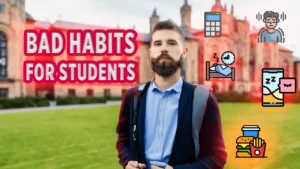7 Effective Study Habits for Working Students

Table of Contents
1. Strategic Time Management
1.1 Utilizing Work Breaks and Downtime
Those five-minute breaks at work are gold. Don’t just scroll through Insta or TikTok; flip through your flashcards instead. A little review here, a quick read there, it all adds up. According to David Allen, productivity guru and author of “Getting Things Done” using your downtime effectively can make a massive difference in your overall productivity. Make every minute count!
1.2 Power Studying
You don’t need hours on end to get studying done. Enter ‘Power Studying’, short, focused bursts of intense brain power. The Pomodoro Technique: 25 minutes of all-in studying, followed by a 5-minute break. Rinse and repeat. This technique isn’t just a fad; it’s backed by science, showing that frequent breaks can improve mental agility. So, work smarter, not harder!
2. Mobile and Flexible Study Solutions
2.1 Digital Tools and Apps
In the digital age, your smartphone is your best friend. Apps like Quizlet for flashcards and Evernote for note-taking can turn your phone into a powerful study tool. As Tony Robbins says, “It’s not about the resources you have; it’s about how resourceful you can be.” Make that tech work for you!
2.2 Creating a Portable Study Kit
We’ve all been there, unexpected downtime (long queue or facing an unexpected delay) with nothing to do. Why not turn it into a study session? Don’t let these moments go to waste, transform them into productive study sessions with a portable study kit! Fill your bag with essential tools like pens, highlighters, and a notebook for quick note-taking or problem-solving on the go. Include a stack of flashcards for efficient review of key concepts, they’re light, easy to carry, and perfect for quick study bursts. Organize your materials in a small folder or envelope to ensure you spend more time studying and less time searching for what you need. You can add personal touches, whether it’s motivational quotes or a stress ball for those challenging moments. With this study kit in your hand, you’re always ready to use every opportunity to learn.
3. Realistic and Practical Goal Setting
3.1 Setting Achievable Academic Targets
Now let’s talk about goals. It’s important to set goals that are challenging but doable. If things change, it’s totally cool to adjust your goals. Zig Ziglar said: “A goal properly set is halfway reached.” So set them up and knock them down!
3.2 Integrating Work and Study Goals
When you’re juggling a job and school, it can feel like you’re living in two separate worlds. But your job and your studies can actually work together like a dream team. How?
Start by looking at the skills and knowledge you’re gaining at work. Can any of this be applied to your class assignments or projects? Maybe there’s a project at work that aligns perfectly with a topic you’re covering in class. Bingo! You’ve just hit the jackpot of time-saving and efficiency.
And it goes both ways. The critical thinking and problem-solving skills you’re developing in school can help you a lot in your job.
4. Efficient Note-Taking and Resource Management
4.1 Quick and Effective Note-Taking Techniques
The Cornell Method, mind mapping, bullet journaling, find a style that clicks with you. Keep your notes clear and concise, and your future self will be so thankful. As Marie Forleo says, “Success doesn’t come from what you do occasionally, it comes from what you do consistently.”
4.2 Organizing Resources for Easy Access
Nothing kills your study vibe like spending hours searching for your notes. Keep everything organized and accessible. When it comes to keeping your academic resources tidy and accessible, it’s all about creating a system that works for you. Utilize folders for different subjects and bookmark those important pages in your textbooks. Also using the cloud storage options like Google Drive or Dropbox, making it easy to access your study materials anytime, anywhere, whether you’re on your laptop or phone. By investing a little time upfront to organize everything, you’re setting yourself up for success and making the most out of every study session.
5. Maximizing Non-Traditional Study Times
5.1 Finding Your Personal Peak Hours
Are you a night owl or an early bird? Knowing when your brain is firing on all cylinders can make a world of difference. Schedule your study sessions for your peak times. It’s all about tuning into your body’s natural rhythms and discovering when your brain is ready to function perfectly.
Ask yourself, am I more of a ‘rise and shine’ kinda person, or does my brain hit its best when the moon is high? Pay attention to when you feel most alert and energized during the day. That is your golden ticket to efficient studying.
5.2 Utilizing Weekends and Off-Days
Alright, it’s the weekend, and while it might be tempting to hit the Netflix hard or dive into a gaming marathon, it’s also prime time to get into a studying marathon.
Weekends and off-days offer this sweet chunk of uninterrupted time, making them perfect for diving deep into those more complex subjects that need a bit more brainpower.
And, don’t forget to include some fun time, too! Balance is key at everything. Make time for a coffee catch-up with friends or a chill movie night. Use your weekends wisely, and keep that brain sharp, a well-rested student is a successful student! “All work and no play makes Jack a dull boy.“
6. Building a Support Network
6.1 Connecting with Fellow Working Students
You’re not in this alone. Connect with other working students. Share tips, resources, and maybe even a few laughs. There’s strength in numbers, and together, you’ll conquer the hustle.
6.2 Understanding and Flexibility at Work
Don’t be shy-talk to your boss about your study commitments. Most employers will respect your drive to better yourself and might even offer support. So speak up and advocate for yourself!
7. Prioritizing Health and Well-being
7.1 Balancing Work, Study, and Personal Life
Since you’re human, not a robot. It’s important to give time for yourself amidst the chaos of deadlines and shifts. Whether it’s a quick coffee break, an outdoors walk, or a favorite show, find those moments to recharge.
Don’t forget about your friends and your family. They’re your support system. Make time for dinners, game nights, or just chill sessions. It’s about quality, not quantity. These moments with your loved ones are precious, and they’re the perfect remedy to the hustle and struggle.
When it comes to work and study, find a rhythm that works for you. Use a planner, set priorities, and most importantly, don’t forget to breathe. You’ve got this! By finding that sweet spot between work, study, and play, you’re setting yourself up for success in every area of your life.
7.2 Stress Management Techniques
Find what helps you remove stress, whether it’s breathing exercises, meditation, or a good workout. Learning and integrating stress management techniques into your routine is very helpful. As Oprah Winfrey said, “Breathe. Let go. And remind yourself that this very moment is the only one you know you have for sure.”
Conclusion
Thank you young hustler for making it this far in this article that we hope it was beneficial for you, and would add some value to your life as a student or employee.
Navigating the student life can be a whirlwind, and I bet many of you are wearing more than just the student hat, you’re also employees, entrepreneurs, or freelancers. And let me tell you, you are a champ. Balancing work with your studies is no easy walk in the park, but it’s an experience that can transform your life in incredible ways.
Working while studying isn’t about the extra cash only (though that’s a sweet bonus!). It’s about growing, learning responsibility, building resilience, and understanding the value of hard work. It prepares you with a unique set of skills that many might not have when they graduate. Imagine stepping into the world, not just with a degree, but with real-world experience under your belt. That’s valuable.
Working while in school is like getting a head start in the race of life. And the experience you develop is goldmine. It’s the kind of stuff that future employers, partners, and even friends will sincerly respect and admire.
Sure, there’ll be times when you feel like you’re at the end of your rope, juggling assignments, shifts, and social commitments. But every challenge you face now is a step closer to a future where you’re not only prepared,you’re ahead.
Your time as student is short, but the habits you form, the skills you acquire, and the experiences you gather stay with you forever.
Keep grinding, keep learning, and keep in mind that every day you’re shaping a future you’ll be proud of.
Read more about 10 Good Study Habits for students in my previous article.
Frequently Asked Questions (FAQ)
Q1: What are effective study habits for working students in high school?
A1: High school students are switching between work and studies are pretty much like any other students (mainly college students), except they don’t have a lot of freedom in time, however the habits that we mentioned above could fit your case if you are a high school student, you should maybe just focus on minimizing the hours of work since you don’t have as much of a free time. But I would want to add or focus on two points:
- Prioritize School Projects: Due to the time constraints from both school and work, you need to identify which school tasks are most urgent and tackle them first.
- Homework First: Before heading to a job or once you’re back, prioritize getting your homework out of the way. The sooner it’s done, the less it’ll hang over your head during work.
Q2: What about effective study habits for working students in college?
A2: College students have more free time that high school students, and they are closer to join real jobs related to their careers after graduation, so the habits we mentioned in this article fits perfectly your case if you are a college student.
Q3: Can you give an example of an effective study habits for working students essay?
A3: An essay on this topic could explore the unique challenges working students face, highlighting specific strategies and habits that contribute to successful balancing of work and study. It could include personal anecdotes, expert quotes, and practical tips to guide students.
Q4: What are some examples of ineffective study habits?
A4: Ineffective study habits might include procrastination, multitasking during study sessions, using passive learning techniques, not reviewing material regularly, and not taking breaks during study sessions. These Ineffective study habits will lead to burnout and lower academic performance.
Q5: Can you list 7 effective study habits?
A5: We have a dedicated full article about 10 good study habits for students. check it out from here!
Q6: What are study habits for working?
A6: Study habits for working students are good hacks to help working students balance their life between school and work, in order to get the best performance out of both of them.
Q7: What are the 10 effective study habits?
A7: Check out our detailed article about 10 good study habits for students.
Q8: How can I focus 100% on studying?
A8: Yes, it is possible, but it requires minimizing distractions to the lowest, creating a conducive study environment, using effective note-taking techniques, and also being in 100% focus at school.
Q9: How to study successfully?
A9: Successful study reqiures a combination of effective time management, strategic goal setting, utilizing the right study tools.
Q10: How can I study smart?
A10: Studying smart means making the most of your study time with focused sessions, using active learning techniques, and constantly adjusting your strategies based on what works best for you.



